#race based immigration
Text
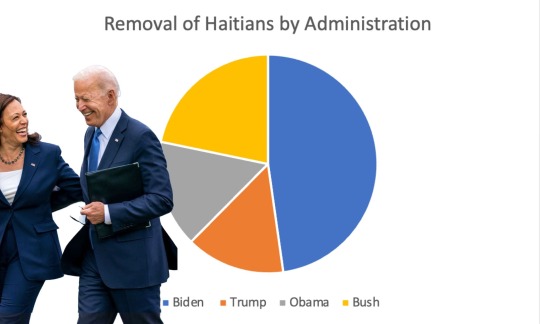
Deporter-in-Chief
#politics#joe biden#title 42#mass deportation#asylum seekers#refugees#deporter in chief#immigration#race based immigration#haiti#anti blackness#race based deportation#racism
28 notes
·
View notes
Text
it's so telling when someone says radical feminism is "white woman shit" and you bring up the fact that in many places such as africa or asia, the only feminism that prominently exists is radical feminism, and for those places it's just considered regular feminism that you get told those women live in places that aren't progressive enough for them to understand their actions properly. to say these women are too dumb to realize that their beliefs are "bad" simply because they don't align with western mainstream liberal feminism is rooted in xenophobia and racism, not to mention a lack of understanding of the struggles and violence women from these countries regularly go through, which can range anywhere from fgm to men rubbing and wiping their cum on the back of women's clothes in trains. but of course, as usual, there's no intelligent response to this so you just end up getting blocked or get rape wished on you.
#my grandma was born and raised in south sudan she considers herself a feminist and her beliefs#along with all of the women she knows believe in what radfems believe in#being against things like surrogacy forced marriage harmful sex culture misogyny male violence and femicide#i live in a primarily hispanic/black area and literally the only people who try to push gender shit on us is white people#and if you say you don't believe in all that you get called an ignorant white supremacist#white people put the mirror down when you're calling non white people white supremacists#anyway today's rant is brought to you by a white guy who told me (a non white darkskin child of 2 immigrants)#that of course i didn't understand gender politics because i'm too privileged#and then went on to say women in south korea aren't 'booksmart' enough to realize their corset movement is a 'terf' movement.....#my mom always tells me do not engage with white people who want to play devil's advocate with race based matters#and yet here i am doing it again lol#/rambling
201 notes
·
View notes
Text
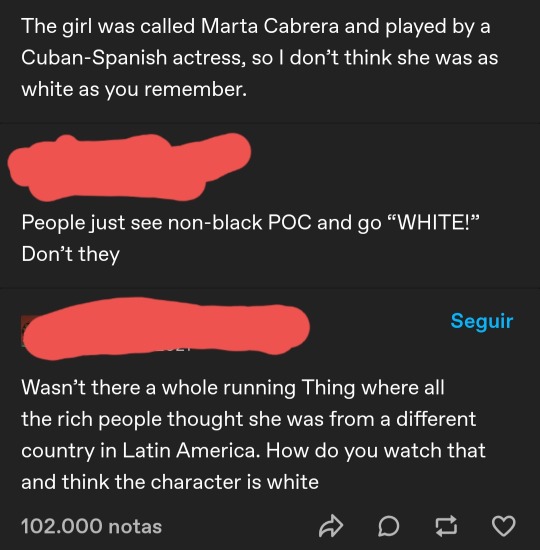
I don't wanna contribute to the post because good lord is it messy in there, but like speaking as a white latino here... y'all should probably be aware that some latinos are white.
#it's a lot more appropriate to see that character's arc as a working class and immigrant family's struggle#than purely race-based
5 notes
·
View notes
Text
Marketing did Elemental DIRTY
Just saw the movie, it was well worth the watch. The trailer made the movie look like some half assed race metaphor Zootopia ripoff with a canned, rehashed love story you've seen a million times.
Let me be clear, Elemental was none of the things the trailer made you believe it was.
First things first, The Romance:
There's a reason aro/ace people are flocking to this movie. The main couple falls in love without having to rely on any passionate kisses or hand holding; they fall for each other based on who they are, their personalities, their interests, their appreciation of the other's uniqueness. The central hand holding comes at a point in the movie well after the two are established as a couple, and have gone on many dates together. This movie makes their characters fall in love over mutual appreciation, not physical chemistry, and its such a genuine, sweet, wholesome romance to see play out
On top of that, this movie goes into a lot of aspects of immigrant life and the expectations that come with being a first born in a new country. The romance does not shy away from this or sweep it under the rug. The romance blossoms as the two learn more about each other, and come to understand and respect those differences.
Second, the movie isn't about romance, its about being an immigrant.
I came into this movie expecting zootopia 2: now with elements, and what I got was a heart-wrenching look into the life of a first generation child in a new land, born to immigrant parents. The movie absolutely does NOT sugar coat things, showing not only an ellis island moment of having your name changed, but also a number of topics ranging from having to navigate in a city made for people who are nothing like you, being denied housing, micro-aggressions, and straight up being denied entry to public places based on who you are.
The true heart of this movie is about the child of immigrants realizing the life she wants for herself, struggling with disappointing people who gave up everything they had so they could give you a better life, repaying that sacrifice and what a burden it feels like, and somehow facing the truth of who and what is staring back at you from the mirror.
Third, and lastly, the movie is absolutely beautiful
The trailers did this movie dirty. You never saw the refracting lights from firelight streaming through water, you didn't see the glassblowing, or how the fire dies down to barely a wisp when Ember is sad to burning like a wildfire when she's angry. You didn't see the scene underwater with the tree and |Spoilers|, you didn't see the world building or the character design that went into the background characters. This movie is absolutely beautiful, and uses light as both a visual treat and a metaphor for the movie's themes. Its absolutely gorgeous.
So, if you're wondering whether to skip this movie or watch it, I'm telling you now: ignore the trailers and go see this in theaters.
5K notes
·
View notes
Text
Conservatives are fringe outliers - and leftists could learn from them
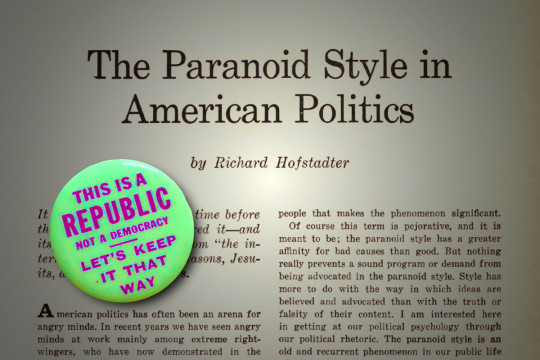
The Republican Party, a coalition between Big Business farmers and turkeys who’ll vote for Christmas (Red Scare obsessed cowards, apocalyptic white nationalists, religious fanatics, etc) has fallen to its bizarre, violent, noisy radical wing, who are obsessed with policies that are completely irrelevant to the majority of Americans.
As Oliver Willis writes, the views of the radical right — which are also the policies of the GOP — are wildly out of step with the US political view:
https://www.oliverexplains.com/p/conservatives-arent-like-normal-americans
The press likes to frame American politics as “narrowly divided,” but the reality is that Republicans’ electoral victories are due to voter suppression and antimajoritarian institutions (the Senate and Electoral College, etc), not popularity. Democrats consistently outperform the GOP in national races. Dems won majorities in 1992/6, and beat the GOP in 2000, 2008, 2012, 2016 and 2020. The only presidential race the GOP won on popular votes since 1988 was 2004, when GW Bush eked out a plurality (not a majority).
But, as Willis says, Dems “act like it is 1984 and that they are outliers in a nation of Reagan voters,” echoing a stilted media narrative. The GOP’s platform just isn’t popular. Take the groomer panic: 71% of Americans approve of same-sex marriage. The people losing their shit about queer people are a strange, tiny minority.
Every one of the GOP’s tentpole issues is wildly unpopular: expanding access to assault rifles, banning immigration, lowering taxes on the rich, cutting social programs, forcing pregnant people to bear unwanted children, etc. This is true all the way up to the GOP’s coalescing support for Trump as their 2024 candidate. Trump has lost every popular vote he’s ever stood for, and owes his term in the Oval Office to the antimajoritarian Electoral College system, gerrymandering, and massive voter suppression.
Willis correctly points out that Dem leaders are basically “normal” center-right politicians, not radicals. And, unlike their GOP counterparts, politicians like Clinton, Obama and Biden don’t hide their disdain for the radical wing of their party. Even never-Trumper Republicans are afraid of their base. Romney declared himself “severely conservative” and McCain “put scare quotes around ‘health of the mother’ provisions for abortion rights.”
The GOP fringe imposes incredible discipline on their leaders. Take all the nonsense about “woke capitalism”: on the one hand, it’s absurd to call union-busting, tax-dodging, worker-screwing companies “woke” (even if they sell Pride flags for a couple of weeks every year).
But on the other hand? The GOP leadership have actually declared war on the biggest corporations in America, to the point that the WSJ says that “Republicans and Big Business broke up”:
https://www.wsj.com/articles/republicans-corporations-donations-pacs-9b5b202b
But America is a two-party system and there are plenty of people who’ll pull the lever for any Republican. This means that when the GOP comes under the control of its swivel-eyed loon wing, the swivel-eyed loons wield power far beyond the number of people who agree with them.
There’s an important lesson there for Dems, whose establishment is volubly proud of its independence from its voters. The Biden administration is a weirdly perfect illustration of this “independence.” The Biden admin is a kind of referee, doling out policies and appointments to its competing wings, without any coherence or consistency.
That’s how you get incredible appointments like Lina Khan at the FTC and Jonathan Kanter at the DoJ Antitrust Division and Rohit Chopra at the Consumer Finance Protection Bureat — the progressive wing of the party bargained for these key appointments and then played their cards very well, getting incredible, hard-charging, hyper-competent fighters in those roles.
Likewise, Jared Bernstein, finally confirmed as Council of Economic Advisers chair after an interminable wrangle:
https://prospect.org/blogs-and-newsletters/tap/2023-06-16-team-biden/
And Julie Su, acting labor secretary, who just delivered a six-year contract to west coast dockworkers with 8–10% raises in the first year, paid retroactively for the year they worked without a contract:
https://www.whitehouse.gov/briefing-room/statements-releases/2023/06/14/statement-from-president-biden-on-labor-agreement-at-west-coast-ports/
But the Biden admin’s unwillingness to side with one wing of the party also produces catastrophic failures, like the martyrdom of Gigi Sohn, who was subjected to years of vicious personal attacks while awaiting confirmation to the FCC, undefended by the Biden admin, left to twist in the wind until she gave it up as a bad job:
https://doctorow.medium.com/culture-war-bullshit-stole-your-broadband-4ce1ffb16dc5
It’s how we get key roles filled by do-nothing seatwarmers like Pete Buttigieg, who has the same sweeping powers that Lina Khan is wielding so deftly at the FTC, but who lacks either the will or the skill to wield those same powers at the Department of Transport:
https://pluralistic.net/2023/02/11/dinah-wont-you-blow/#ecp
By refusing to stand for anything except a fair division of powers among different Democratic Party blocs, the Biden admin ends up undercutting itself. Take right to repair, a centerpiece of the administration’s agenda, subject of a historic executive order and FTC regulation:
https://pluralistic.net/2022/10/18/administrative-competence/#i-know-stuff
Right to Repair fights have been carried out at the state level for years, with the biggest victory coming in Massachusetts, where an automotive R2R ballot initiative won overwhelming support in 2020:
https://pluralistic.net/2020/11/13/said-no-one-ever/#r2r
But despite the massive support for automotive right to repair in the Bay State, Big Car has managed to delay the implementation of the new law for years, tying up the state in expensive, time-consuming litigation:
https://pluralistic.net/2021/05/26/nixing-the-fix/#r2r
But eventually, even the most expensive delaying tactic fails. Car manufacturers were set to come under the state right to repair rule this month, but they got a last minute reprieve, from Biden’s own National Highway Traffic Safety Administration, who sent urgent letters to every major car manufacturer, telling them to ignore the Massachusetts repair law:
https://www.vice.com/en/article/m7bbkv/biden-administration-tells-car-companies-to-ignore-right-to-repair-law-people-overwhelmingly-voted-for
The NHTSA repeats the car lobby’s own scare stories about “cybersecurity” that they blitzed to Massachusetts voters in the runup to the ballot initiative:
https://pluralistic.net/2020/09/03/rip-david-graeber/#rolling-surveillance-platforms
The idea that cybersecurity is best maintained by letting powerful corporations gouge you on service and parts is belied by independent experts, like SecuRepairs, who do important work countering the FUD thrown off by the industry (and parroted by Biden’s NHTSA):
https://securepairs.org/
Independent security experts are clear that letting owners of high-tech devices decide who fixes them, what software they run, etc, makes us safer:
https://www.schneier.com/essays/archives/2022/01/letter-to-the-us-senate-judiciary-committee-on-app-stores.html
But here we are: the Biden admin is sabotaging the Biden admin, because the Biden admin isn’t an administration, it’s a system for ensuring proportional representation of different parts of the Democratic Party coalition.
This isn’t just bad for policy, it’s bad politics, too. It presumes that if some Democratic voters want pizza, and others want hamburgers, that you can please everyone by serving up pizzaburgers. No one wants a pizzaburger:
https://pluralistic.net/2022/10/23/narrative-warfare/#giridharadas
The failure to deliver a coherent, muscular vision for a climate-ready, anti-Gilded Age America has left the Democrats vulnerable. Because while the radical proposals of the GOP fringe may not enjoy much support, there are large majorities of Americans who have lost faith in the status quo and are totally uninterested in the Pizzaburger Party.
Nowhere is this better explained than in Naomi Klein’s superb long-form article on RFK Jr’s presidential bid in The Guardian:
https://www.theguardian.com/commentisfree/2023/jun/14/ignoring-robert-f-kennedy-jr-not-an-option
Don’t get me wrong, RFK Jr is a Very Bad Politician, for all the reasons that Klein lays out. He’s an anti-vaxxer, a conspiracist, and his support for ending American military aggression, defending human rights, and addressing the climate emergency is laughably thin.
But as Klein points out, RFK Jr is not peddling pizzaburgers. He is tapping into a legitimate rage:
a great many voters are hurting and rightfully angry: about powerful corporations controlling their democracy and profiting off disease and poverty. About endless wars draining national coffers and maiming their kids. About stagnating wages and soaring costs. This is the world — inflamed on every level — that the two-party duopoly has knowingly created.
RFK Jr is campaigning against “the corrupt merger between state and corporate power,” against drug monopolies setting our national health agenda, and polluters capturing environmental regulators.
As Klein says, despite RFK Jr’s willing to say the unsayable, and tap into the yearning among the majority of American voters for something different, he’s not running a campaign rooted in finally telling the American public “the truth.” Rather, “public discourse filled with unsayable and unspeakable subjects is fertile territory for all manner of hucksters positioning themselves as uniquely courageous truth tellers.”
We’ve been here before. Remember Trump campaigning against a “rigged system” and promising to “make America great again?” Remember Clinton’s rejoinder that “America was already great?” It’s hard to imagine a worse response to legitimate outrage — over corporate capture, declining wages and living conditions; and spiraling health, education and shelter costs.
Sure, it was obvious that Trump was a beneficiary of the rigged system, and that he would rig it further, but at least he admitted it was rigged, not “already great.”
The Democratic Party is not in thrall to labor unions, or racial equality activists, or people who care about gender justice or the climate emergency. Unlike the GOP, the Dem establishment has figured out how to keep a grip on power within their own party — at the expense of exercising power in America, even when they hold office.
But unlike culture war nonsense, shared prosperity, fairness, care, and sound environmental policies are very popular in America. Some people have been poisoned against politics altogether and sunk into nihilism, while others have been duped into thinking that America can’t afford to look after its people.
In this regard, winning the American electorate is a macrocosm for the way labor activists win union majorities in the workplaces they organize. In her memoir A Collective Bargain, Jane McAlevey describes how union organizers contend with everything that progressive politicians must overcome. A union drive takes place in the teeth of unfair laws, on a tilted playing field that allows bosses to gerrymander some workers’ votes and suppress others’ altogether. These bosses have far more resources than the workers, and they spend millions on disinformation campaigns, forcing workers to attend long propaganda sessions on pain of dismissal.
https://doctorow.medium.com/a-collective-bargain-a48925f944fe
But despite all this, labor organizers win union elections and strike votes, and they do so with stupendous majorities — 95% or higher. This is how the most important labor victories of our day were won: the 2019 LA teachers’ strike won everything. Not just higher wages, but consellors in schools, mandatory greenspace for every school in LA, an end to ICE shakedowns of immigrant parents at the school-gate, and immigration law help for students and their families. What’s more, the teachers used their unity, their connection to the community, and their numbers to get out the vote in the next election, winning the marginal seats that delivered 2020’s Democratic Congressional majority.
As I wrote in my review of MacAlevey’s book:
For McAlevey, saving America is just a scaled up version of the union organizer’s day-job. First, we fix the corrupt union, firing its sellout leaders and replacing them with fighters. Then, we organize supermajorities, person-to-person, in a methodical, organized fashion. Then we win votes, using those supermajorities to overpower the dirty tricks that rig the elections against us. Then we stay activated, because winning the vote is just the start of the fight.
It’s a far cry from the Democratic Party consultant’s “data-driven” microtargeting strategy based on eking out tiny, fragile majorities with Facebook ads. That’s a strategy that fails in the face of even a small and disorganized voter-suppression campaign — it it’s doomed in today’s all-out assault on fair elections.
What’s more, the consultants’ microtargeting strategy treats people as if the only thing they have to contribute is casting a ballot every couple years. A sleeping electorate will never win the fights that matter — the fight to save our planet, and to abolish billionaires.
If only the Democratic Party was as scared of its base as the Republicans are of their own.

If you’d like an essay-formatted version of this post to read or share, here’s a link to it on pluralistic.net, my surveillance-free, ad-free, tracker-free blog:
https://pluralistic.net/2023/06/16/that-boy-aint-right/#dinos-rinos-and-dunnos

[Image ID: The title page of Richard Hofstadter's 'Paranoid Style in American Politics' from the November, 1964 issue of Harper's Magazine. A John Birch Society pin reading 'This is REPUBLIC not a DEMOCRACY: let's keep it that way' sits atop the page, obscuring the introductory paragraph.]
#pluralistic#tgop#politics#centrism#centrism kills#qgop#democrats in disarray#trumpism#conservatives#robert f kennedy#Massachusetts#climate emergency#naomi klein#oliver willis#right to repair#pizzaburgers
2K notes
·
View notes
Text
Alright GO fans, let's talk Sodom and Gomorrah. This biblical story comes up a few times in Good Omens canon, a kind of offhand mention each time, and the most interesting part to me is the implication that Aziraphale was there.
If you only know the cliff-notes version, you've probably heard it as the story of God condemning homosexuality to the point of wiping out several cities over it. Maybe you've heard this too, but - that's not exactly what happened. Look, I'm an atheist, I have no dog in this race. If I thought it was about smiting people for homosexuality, I'd be happy to call God a wanker and move on. But I've read the story of Sodom and Gomorrah (You can too! It's very short!) and I've read other parts of the Bible that reference it, and I think a much more straightforward interpretation is that it's about offering hospitality and protection to strangers. It's also about the consequences of wanton cruelty, and God laying waste to those deemed beyond salvation.
In Good Omens, the book, Aziraphale and Crowley discuss Sodom and Gomorrah this way:
"Come off it. Your lot get ineffable mercy," said Crowley sourly.
"Yes? Did you ever visit Gomorrah?"
"Sure," said the demon. "There was this great little tavern where you could get these terrific fermented date-palm cocktails with nutmeg and crushed lemongrass-"
"I meant afterwards."
"Oh."
According to the book, then, Aziraphale at least saw the city after it was destroyed. Maybe Crowley saw the aftermath too or maybe he just heard about it. They both understand it as horrific.
The show is more direct, and suggests that Aziraphale was there during the actual destruction. Gabriel asks if Aziraphale remembers Sandalphon. Aziraphale does.
"Sodom and Gomorrah. You were doing a lot of smiting and turning people into salt. Hard to forget."
Aziraphale regards Sandalphon warily during the conversation. I believe we're supposed to interpret this scene based on the popular understanding of Sodom and Gomorrah as cities that God wiped out because of the inhabitants' sins. The obvious implication, then, is that Sandalphon is the heavy, the one called in to deal with disobedience. He's trigger-happy, relishes violence, and Aziraphale has seen what he's capable of. From the careful way Aziraphale discusses their prior acquaintance, I think he feels the destruction of Sodom and Gomorrah was a tragedy and believes Heaven's actions were disproportionate and unjust.
I'm confident this is how we're supposed to read the scene. In the context of the story, we're supposed to understand that Aziraphale doesn't approve of the smiting, and that he feels threatened by Gabriel and Sandalphon coming into his bookshop and pressing him about Armageddon. But I'm fascinated by what it would mean if Aziraphale and Sandalphon's history really tracks onto the story of Sodom and Gomorrah. Because if Good Omens' version of Sodom and Gomorrah is at all biblically accurate, and if Aziraphale was there... it's kind of mind-blowing, actually, that he still feels so much compassion for the people who died and still thinks Sandalphon was wrong.
I'm going to explain why, but fair warning, it gets ugly. I promise nobody is actually raped, and I think that promise in itself says plenty.
According to the Bible, Sodom and its surrounding cities are accused of being overrun with sin. God sends two angels to Sodom to verify this, intending to destroy everything if they find it to be true. In the world of Good Omens, I think one of these angels must be Aziraphale. The other one is likely Sandalphon, but in the Bible it's God rather than either of the angels who rains down burning sulfur on the cities so it's possible it's someone else, and Sandalphon is only on smiting duty. Without anything else to go on, though, let's assume it's Sandalphon.
So our two angels arrive at Sodom in the evening, and at the gate to the city, they meet Lot. Lot is an immigrant who has made his home in Sodom, and I think the implication is that this is why he's not completely steeped in sin like everyone else. In any case, he immediately offers to put the angels up for the night, and although they'd planned to stay in the square, Lot is really insistent. He is a good host! Also, he knows the city is dangerous. So the angels go to his house and he makes dinner for them, and then before they can go to bed, a mob shows up at the door.
See, the men of Sodom have heard about the strangers staying with Lot. They surround his house and demand he hand them over. The New King James Version puts it this way: And they called to Lot and said to him, "Where are the men who came to you tonight? Bring them out to us that we may know them carnally." Several other translations say that the men wanted to "have sex with them". But I mean. It's a fucking mob. They've surrounded the house. We all get what this is, right?
So Lot goes out to meet the men, and he says "Don't do this terrible thing." Off to a good start! Then he says, "Tell you what, I have two virgin daughters. Do what you like to them and we'll say no more about it." Oh boy. Dad of the year award, right there. But still, he insists, "The angels are under my roof and my protection."
The men outside Lot's house are pissed. They say, "You're an outsider, who are you to judge us?" They threaten to do worse to him than to the angels. They swarm him and almost break the door down, but the angels pull him back inside.
The angels then strike the mob with blindness to stop them getting into the house. They say to Lot, "Look, you gotta take your family and get out of here. God sent us to see how bad things were and, uh, long story short, we're burning it all to the ground. You get it, right?"
Maybe you know the rest. Lot's son-in-laws don't believe him and won't leave the city. Lot's wife looks back and turns into a pillar of salt. Lot and his daughters take shelter in a small town called Zoar, and from there flee to the mountains. Everything else is destroyed.
It is a tragedy. The plains are leveled down to ash, until there's nothing left that can even grow. Was there really no one innocent in those cities? No children or animals? (You can't kill kids). Still, I think about that awful night under Lot's roof and I don't think I could blame anyone for giving up on all of it.
So what if that's the story? There were two angels in Sodom before it fell. What if it really was Aziraphale and Sandalphon, trapped through the night in a stranger's house, surrounded by men who want to rape them. Whatever their power as angels, that has to be terrifying.
If it was Sandalphon there with Aziraphale that night in Sodom, I have to wonder what he was like. There isn't any kinship or understanding from Aziraphale. Despite knowing the circumstances better than anyone, he still sees Sandalphon as a threat. Given that, I think Sandalphon must have taken a truly disturbing kind of joy in raining down vengeful fire and brimstone, beyond what you might expect from someone who was afraid or angry. Maybe he was never afraid; maybe instead he revelled in the violence building through the night as the reason he needed to tear everything down. Maybe he was afraid in the terrible way that exposes the depths someone will sink to to protect themselves (maybe offering his daughters was never Lot's idea). Or maybe Aziraphale just tried to reach out to him afterwards, to offer understanding and ask for some in return, and Sandalphon shot him down so coldly and viciously that Aziraphale knew immediately this wasn't something he was allowed to have feelings about. Whatever happened that night, it left Aziraphale feeling more of an outsider from Heaven than ever.
But if it happened that way, it happened this way too: Aziraphale survives a night like that, and when he looks out into the breaking dawn, he thinks, these cities don't deserve to burn. He sees the good in a place that's just shown him its absolute worst. I think that says everything about him as a character, actually. Of course he won't give up on Heaven. Of course he'll fight tooth and nail for his home on Earth. Whatever the worst is, there are still things worth saving. There are still, always, people worth protecting.
On that note, before I wrap this up, I want to go back to Lot's words to the men of Sodom, and draw a parallel that makes me feel some kind of way. Because when Lot declares the angels under his protection, what he says is essentially, "Do not do anything to these men, for they have come under the shadow of my roof for protection." And all I can think about, reading these lines, is Aziraphale standing in his bookshop as it's surrounded by hostile demons, and telling the angel under the shadow of his roof, "You came to me. I said I would protect you. And I will."
717 notes
·
View notes
Text
World Map Notes: the Elven Northern & Southern Central Continents

These nations are where all the elves in the story except Marcille and Thistle are from. This post collects all the information I could find about these two nations, and included a bit of analysis based on that information.
TL;DR (includes both fact and my speculation):
The Northern Central Continent is a feudal monarchy with a strong class system, as well as strict borders, & could probably be considered an ethnostate. It's deeply hierarchical, and the queen is a traditionalist - so it's probably very structurally biased against non-elves and half-elves.
Elves in the NCC practice cannibalism in some rural areas!
The Southern Central Continent is more diverse, with a large tallman population on its South Coast.
To elves, "Court Magicians" exclusively refer to those serving the elven queen - a prestigious role that seems likely to be only open to nobles.
The SCC may not be a monarchy, though it's not clear what kind of leadership or societal structure it does have.
The NCC will habitually take anyone involved in ancient magic as a criminal to prosecute on their terms, regardless of jurisdiction, but this depends on their political influence and ability to pressure local leaders to agree to extradite the criminal.
Elves VS Dwarves and Gnomes may have been at war around the time of the Golden Kingdom being sealed. This conflict also may be one of the factors pushing the kingdom to be sealed in the first place.
The "Central Region" might be the origin of the "Common Tongue" that our characters speak.
Northern Central Continent
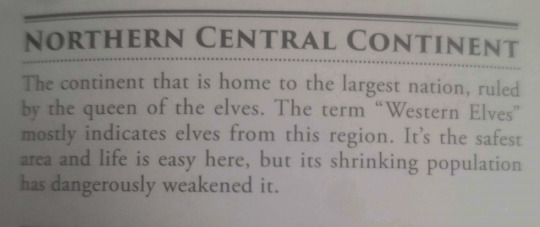
The Adventurer's Bible | p. 132
For this place to have a high quality of life, and also a declining population - especially when it's so close to the Western Continent, which is stated to have poor quality of life - there must be strictly maintained borders and a strong anti-immigration policy. Based on the attitude of the elves, I wouldn't be surprised if it was very difficult to move there unless you are also an elf.
It could probably be considered an ethnostate - and while in these kinds of fantasy worlds, that's pretty common. Take Rivendell, or Moria, in LOTR - they take for granted that these kinds of different fantasy races will live in separate communities.
But that isn't actually realistic, and I think Kui has considered it as more of a politically established status quo rather than an obvious natural result of having magically distinct "races". Which, even in Dunmeshi, I think is a difficult and not-terribly-accurate way to represent politics - racism does not emerge from actual, physical differences between races, after all.
But Dunmeshi's presentation of this idea is interesting, because of the recognition that if there is an "elven nation" which prioritises the interests and rights of elves over other races, that is because there's a deliberate, concerted effort to keep it that way.
But there's a small section of the NCC with a high tallman population - I wonder what kind of community they have, and how they fit into the strict elven hierarchy?
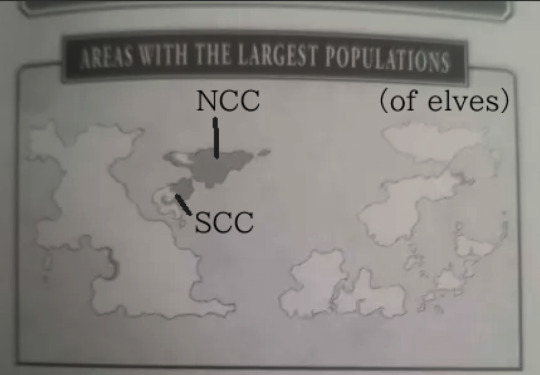

The Adventurer's Bible | pp. 134 & 136
Kabru and Rin, and other kids like them, who are adopted or taken as adopted children(rarely - the way Milsiril treats Kabru is not perfect, but she's deliberately attempting to be better than other elves.... meaning other elves are usually worse)/pets/objects by elven nobles, as well as accomplished or notable individuals who earn the elves' favour/are "invited" to stay (such as they try with Laios at the end of the story) would be an exception.
Other long-lived races could probably (...?) visit, but given the historical conflict between elves, dwarves, and gnomes, I think they'd also be pretty hostile to many of them coming to live on the NCC, even if they see them as more like equals.
Social Structure & Nobility
The Northern Central Continent is an absolute monarchy under a 372 year old queen, Heimeya (IDK what the official romanisation of her name will be).
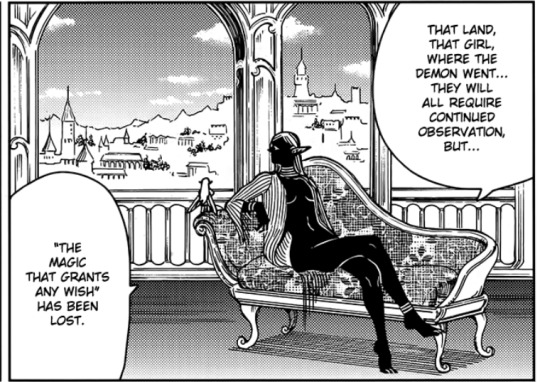
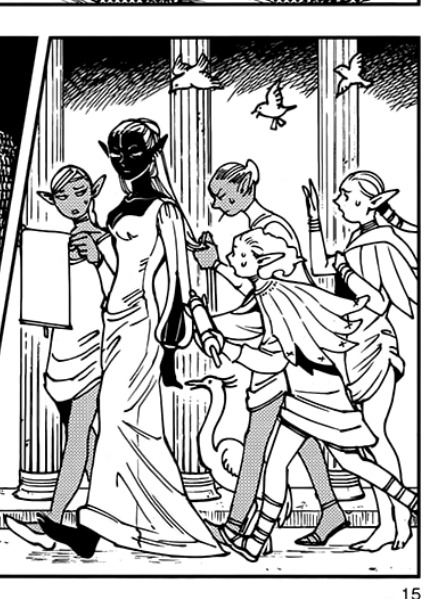
...With extended "nobility", which are the group that the canaries' guards draw from. We don't get much clarification of what sort of structure their nobility has, what titles there are, and where our characters who are nobles fall into it.
Pattadol (House of Vari), Mithrun (House of Kerensil), and Milsiril (House of Tol) are nobles.
Mithrun's noble house, Kerensil, is apparently a well-known family of investors! I wonder what sorts of businesses they invest in & what the elven economy is like?
Milsiril's house, on the other hand, is a well-known military family. I wonder if Kabru could claim the surname "of the House of Tol". He did go to family gatherings after all. But if he was comfortable doing so and it would be accepted, I would assume he'd have done so when introducing himself to the canaries.
Flamela is a distant relative of the queen, who has additional status due to exhibiting the genetic trait associated with their queens, extremely dark skin.
The queen is a "staunch traditionalist" who wouldn't even acknowledge a half-elf like Marcille. Nice! I really feel bad for Kabru and Rin growing up as tallmen in this sort of culture.
Court Magicians
While generally this is a term for any magic user who serves in a royal court, in the Northern Central Continent it seems to carry a lot of esteem; even just as the daughter of one, Pattadol assumes Marcille has the right to boss her around and to handle highly secret, highly illegal ancient magic secrets.
That makes sense, as in the society of the Northern Central Continent, you'd be directly serving the elven queen. But also, she has enough Court Magicians that Pattadol would not expect to know Marcille's mother's name, but few enough that it would be a big deal and Cithis would know about it if one had a half-elf child.
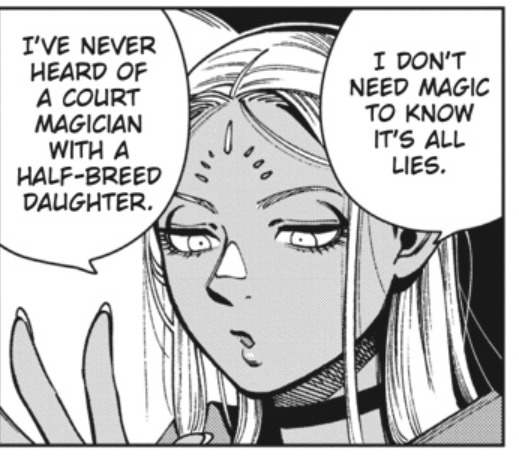
I don't think it's remotely unlikely based on that to assume that this role is only available to nobles.
A "Court Magician" who doesn't serve the NCC Queen isn't a "real" Court Magician in the eyes of NCC elves. Those short-lived monarchs would be happy just to have an elf around regardless of whether they were actually any good at magic.... according to Cithis.
Magic seems very important to the society of the NCC elves. The queen communicates with her subordinates via familar, and the birds we see surrounding her seem like they are some kind of magic - perhaps not familiars since we see her familiar, but some other kind of scrying?
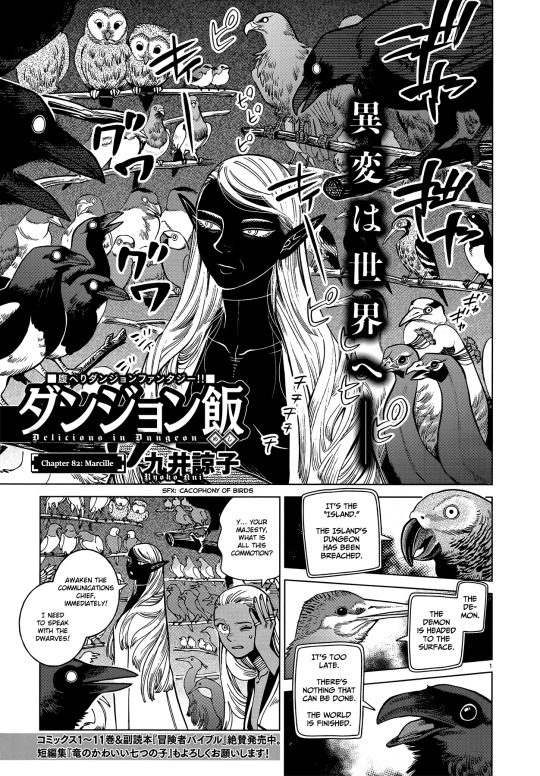
Also, based on the fact Pattadol assumes a Court Magician would be serving the Queen of the NCC, we can theorise that perhaps whatever structure the SCC has, it isn't a monarchy....? Heimeya is "the queen of the elves", after all - that doesn't sound like there's another elven monarch competing for the title just next door.
Ordinary People
Apparently the NCC is a safe place and life is easy -- but given the strict class system, I kind of expect that varies a lot depending on the family you're born into.
The only elves we meet who are not nobles are the convicted criminal canaries, so it's hard to get a sense of what life is like for them from that. Cithis was apparently a wealthy fortune teller with "an intense jealousy for those born noble or wealthy." So I assume she was not born into comfort.
Apparently "There are also primitive villages deep in the woods and underground, and in some regions cannibalism is still practiced." Which is awesome. Based on her videogame elves art I think Kui's probably making a little nod to Divinity: Original Sin elves, who can absorb memories through eating the flesh of others. Elves in dungeon meshi don't have this trait, but I wonder if there is a magical ritual or some kind of cultural practice with a similar intention.
Cuisine
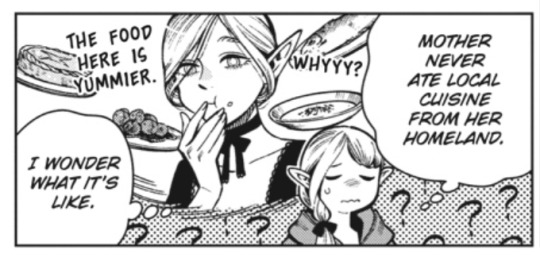
Marcille's mother didn't think much of the elven cuisine.
Liricmumwarel is fancy candy given out by the elven queen the shape of which conveys blessings.
Elf Cake is a crumbly dry cake that Kabru and Thistle don't think much of. I've heard someone discuss what it's likely to be made of, but I am afraid I don't recall.
Southern Central Continent
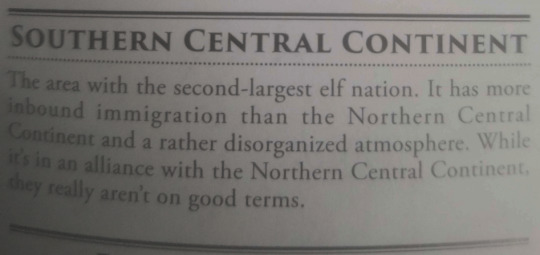
The Adventurer's Bible | p. 132
It seems like the Southern Central Continent gets a lot more immigration and has a more diverse population, especially along the south coast (near the Western Continent). That south coast has a high tallman population.
Fleki and Lycion are from the Southern Central Continent. Fleki got into ancient magic for the money, so you can assume there's probably class disparity there too; things are noted by Kui to be more "disorganised" than the NCC. Not a bad thing at all - the NCC is definitely too "organised" in my books. But that does potentially also mean there's less, e.g., bureaucracy, central organisation, less of a social safety net. But then again, in the NCC I doubt that whatever "safety net" there is, is available to everyone.
We can't extrapolate much from Fleki & Lycion's personalities, because they clearly aren't in the most stable societal position, and I get the sense that they're the countercultural type - they probably don't represent the type of person typical to the SCC. Also, our NCC characters are all either nobles or used to navigating high society (Cithis, Kabru to an extent) so they aren't exactly a typical "ordinary NCC person" as a basis for comparison either. However, there's less of a "strict set of social rules" type of feel to the SCC characters, fitting with my suggestion that the SCC may not be a society with a strong feudal element.
Geopolitics & Conflict
The fact that, despite their being from the SCC, Fleki and Lycion are in the Canaries, who work directly under the NCC's Queen, implies that the the NCC feel entitled to process and prosecute people who commit ancient magic-related crimes regardless of any notion of "jurisdiction". This is backed up by the way that they were going to take Marcille - but that is something that the governor of the Island had to give permission for, which Laios is able to withdraw. So I assume that the NCC elves apply pressure on various world leaders to extradite criminals involved in ancient magic.
The SCC would cooperate with this, since they're allies, even if they don't have a great relationship (according to the World Guide).
The NCC are also clearly able to take half-foots without trouble, as we see by Chilchuck saying he's known half-foots who got involved with "black magic" (ancient magic) and were disappeared by the elves. But I doubt gnomes or dwarves are giving people up easily - though that probably doesn't go for dwarves like Senshi and Namari, without strong community ties.
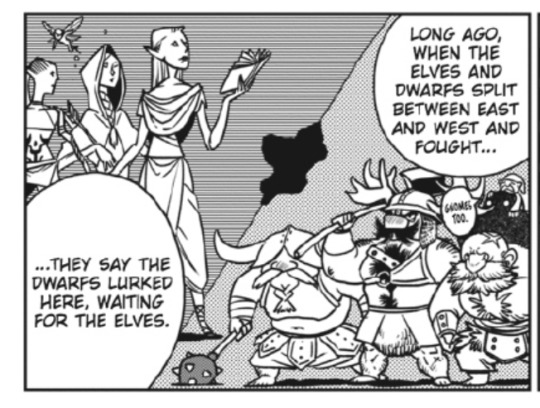
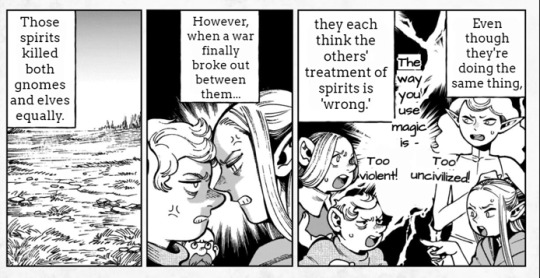
Long before the current times, elves fought dwarves & gnomes. There might have been more than one of these conflicts...? While long ago, this war isn't "ancient" (like the ancients who sealed the demon into dungeons, before their world was mostly destroyed by it).
Thistle, Delgal, and the Golden Kingdom were (I believe) caught up in one of these conflicts, which used Melini as a staging ground - thus why Thistle was pushed to seal the entire kingdom in the dungeon.
To do this, Thistle unseals a dungeon created by the "ancient people". These could be the "ancients" who created the dungeons, before the apocalypse. Or they could be another, still extinct, society.
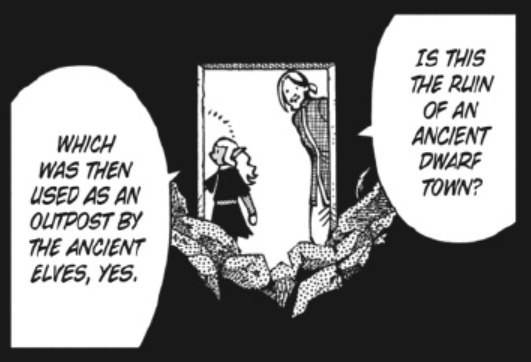
Regardless, at least one of these conflicts seems to have taken place after the golden kingdom was sealed - so, within the last 1000 years.
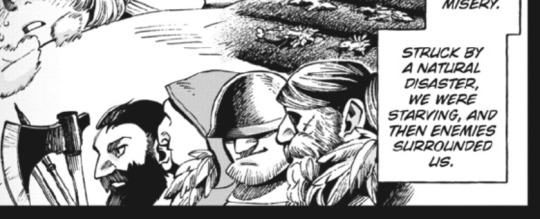
Though, this could refer to a different, more localised conflict between the Golden Kingdom and their dwarven neighbours.
The order of events is that the Golden Kingdom was sealed (1000 years ago or so) > Dwarves took over > Elves stole the land from the Dwarves ("long ago" by the Island Lord, a tallman's, standards) > Elves gave the land to a local lord, who was either an ancestor of the Island Lord, or the Island Lord himself. The Island Lord is himself a descendant of the lord who poisoned Delgal's father, as is noted in the World Guide. However, it isn't impossible for there to be large gaps of time between these events, which could put the elf / dwarf wars at a more recent date.
The fact we know that the elves stole the land from the dwarves, and then granted it to a political actor who was relevant during the events of the Golden Kingdom flashbacks we see suggests to me that the events were roughly contemporaneous. If they were, that puts at least one of these conflicts at roughly 1000 years ago.
So, the elf/dwarf & gnome conflict is "long ago" by short-lived standards, but would be considered "modern" by the long-lived races, if you ask me. At least, the equivalent of the World Wars for us - recent history, even if we weren't alive.
I'm guessing the "Elf King" from the below panel in fact was a word that's more gender-neutral in Japanese, since the "Western Elves" definitely have a queen.
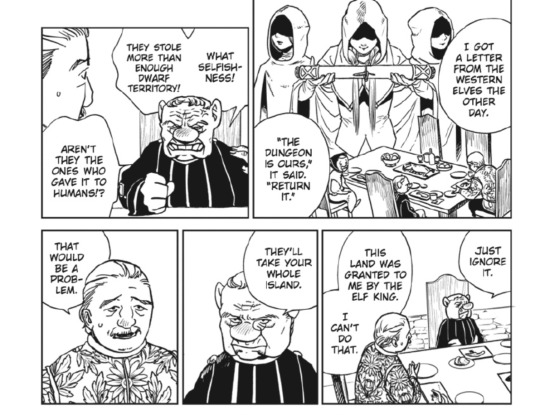
Language
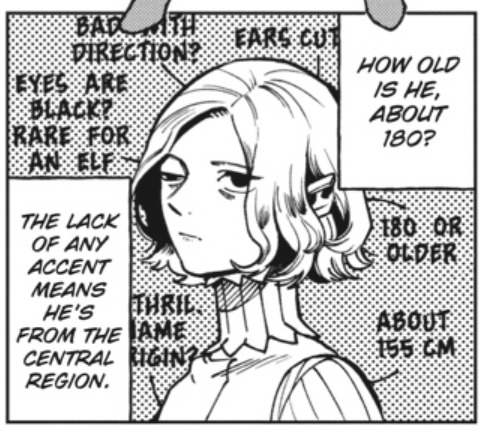
When Kabru says the "Central region" I expect he means the region where the NCC and SCC is.
The fact that he observes that the lack of any accent means he's from the Central Region is really interesting. It could mean two things;
either they switched to speaking in the language spoken on those continents, which Kabru would naturally know, having grown up there. It's 100 percent possible, but I think this would be noted in the story.
or, the language that gets called "the common tongue", the one that all our principle characters speak for most of the story, originated from the elves in the Central Continent. Or at least it's the same one that the elves use, and their political influence is great enough that their accent gets to be considered not an accent at all. The fact they were "granting" land in this area to tall-man lords suggests a large enough historical influence in the area that this is quite plausible to me.
Mithrun absolutely does have an accent - nobody speaks without an accent. His accent is just politically and socioculturally normalised to the point of being considered the "default/proper" way to speak - like received pronounciation in English.
The common tongue isn't ubiquitous everywhere - not just Kuro, but Kiki and Kaka are also noted to be studying the common tongue. The Tansus were born on the Eastern Continent, so probably gnome communities there speak their own language - Kiki and Kaka grew up primarily surrounded by gnomes after all.
It's also quite likely that Kabru, specifically, because of where he grew up, would consider Mithrun's way of talking to be the default "not an accent" accent. His adoptive mother surely has the same upper-class NCC accent. I expect that other characters might experience it as more "marked".
This isn't a world where everyone speaks the same language everywhere; the common tongue is called that, but there are many different languages. Kabru and Chilchuck are two characters who are adept with many of them - Kabru speaks the language of the kobold, and probably lots more. Chilchuck works as an interpreter as part of his union stuff - I can tell you from experience that that's a hugely valuable skillset in that context, as many of the people who most need union representation are people who don't speak the dominant language, or at least not fluently.
If you got all the way to the end of this post.... thank you for reading, I love you. Check out my other World Map Notes under that tag on my blog; I've made a few so far and there will almost certainly be more. Next I'm thinking the dwarven nations...? But I could be persuaded if someone had a preference.
Also, anyone got any speculation on what, exactly, is the previous time that Heimeya ate a person/monster/chimera that this panel implies:

We really don't have anything to go on whatsoever, but I think it's a fun tidbit.
#og post#dungeon meshi manga spoilers#dungeon meshi meta#dunmeshi#dungeon meshi analysis#delicious in dungeon spoilers#dunmeshi spoilers#delicious in dungeon#dunmeshi meta#the canaries#milsiril#mithrun#kabru of utaya#i feel sooooooo sane to have made this. but it has some super interesting details imo#colour coding only on the TLDR just cause I dont want ppl to take my theories as fact#character info I drop without a panel comes from the world bible#world map notes
240 notes
·
View notes
Text
The two most popular reads of the synth plight in Fallout 4 are that of the race allegory and the Red Scare/McCarthyist allegory. In the former example, synths get racialized in a similar way to Black Americans in the late 19th and early 20th century, but just barely. The Underground Railroad is quite literally remade, synths are subjected to slavery at the hands of their human creators and punished harshly for escape attempts. Others have likened synths to fears of immigrants or asylum-seekers from nonwhite majority populations. Synths in these imaginings of Fallout 4 are painted as needing to be saved at the same time as they are vilified and dehumanized – sometimes by the same character over the course of the story. This duality could be a great opportunity for a dive into how white saviorism tends to play out, but in reality it ends up being a messy, deeply uncritical exploration of the impact of race and racism in society. The factions doing the racialization and/or saviorism’s motives are never questioned, and there is a very clear depiction of “good vs. evil” being the end-all-be-all of anti-racism work (again, with no critical thought as to how the “good” side is made almost completely of non-racialized people making decisions on behalf of a marginalized group). Worse yet, it’s contrived. The android-racism analogy has been a thorn in the side of the science fiction genre ever since Isaac Asimov wrote the 3 Laws of Robotics. There’s very few iterations on the idea that have come from popular (white, Eurocentric) media that aren’t riddled with the same aftertaste of white guilt and fundamental misunderstandings of how racism plays out in day-to-day life.
The less common, slightly more agreeable interpretation is that of the Red Scare – which, given Fallout’s inspirations and the setting’s original critique of reliving America’s “good old days”, makes perfect sense. In this example, synths take the role of the Soviet spy: watching over everything Americans are doing and reporting back to a secret base that is plotting to overthrow the world as we know it. Psychological screenings as well as inhumane tortures are utilized to pick synth “spies” out from the good, red-blooded residents of the Commonwealth. A neighborhood is founded entirely around the protection of the “old ways of life”, complete with a white picket fence comically decorated with automatic machine gun turrets. While this is a more charitable analogy that’s grounded in a slightly-deeper-than-surface-level exploration of American history, the Red Scare interpretation is victim to the same pitfalls that plague the racism interpretation.
Midway through the game, the player discovers that there actually is a secret base of evil villains hiding underneath our feet, plotting to annihilate our beautiful Commonwealth lives. People do get taken and replaced by synths, they are in our governments, there is an actual reason for synths to be feared. Sure, some synths are perfectly fine people with no wish to be made tools of the Institute’s tyranny, but that is greatly overshadowed by the fact that the Institute’s stated goal is to use synths to gain control over the Commonwealth. There is no real critique of McCarthyism, there is no ideology to be challenged, because the Communists are here and killing your loved ones in their sleep.
#4#txt#my art#long post#meta#working on a transcript of a instagram highlight i made ages ago#with updated language and whole new paragraphs -- this is one of them#eventually i will be talking about acadia & how far harbor handles synth marginalization waaaaaaay better than vanilla fo4. of course#you didnt think this WOULDNT eventually devolve into dimaposting did you? oh you know so little of me <3
312 notes
·
View notes
Text
”Why do racists always invoke MLK…?”
This is a comment from Reddit. I swear to god, it’s like the redditor who wrote this transcribed all the shit my racist, entitled, privileged, Boomer parents said my entire childhood. Like, word for word.
”Why do racists always invoke MLK…?”
First, you gotta understand their position, which is “Racism doesn’t exist anymore”. Because black people aren’t lynched, because there are wealthy rappers and basketball players, and because there was a black president, racism doesn’t exist in the US anymore. And this is especially important; when black people get upset about their lot in life, it is because they are lazy and want a handout rather than earning their way like white people do. When a black guy is killed by cops, he was a criminal and deserved his fate. When a black woman loses her access to food stamps, it is because she was taking advantage of the system. When black people get into college, it is because they are given special privilege they didn’t earn. And when black folks talk about reparations, it is because they want to punish innocent people so they can be handed their success rather than earn it.
Because there is no racism, and anytime some white person is called a racist it is likely because they don’t support simply handing success and money over to people who haven’t earned it, and not at all because they act racist in any way. And the term “racist” has become toxic in the US lately; people lose their jobs after being called racists unfairly. Heck, one could suggest minorities call white folks “racist” in retaliation, knowing there will be social consequences which are completely unearned. So to combat this unfair and, in their view inaccurate, narrative they employ a couple tactics;
1) “I’m not racist, you are for even suggesting it”. Since racism is defacto non-existent, playing the race-card is introducing a factor that doesn’t belong. When a black person calls a white person racist, they are not only lying, but specifically targeting someone based on their race and falsely labeling them something socially toxic with intent to cause harm. And the white person is defacto innocent because they would see anyone as insert accusation here, not just black/brown/gay/muslim/female/handicapped/immigrant people.
2) “Black people don’t know how good they have it”. Classic myopic delusion that assumes the complete lack of racism in the US also means any ongoing hurdles faced by black/brown/gay/women/etc people are their own fault. The fears behind CRT are great examples of the struggle to maintain this delusion, and not have people delve too deeply into history and see how cause/effect resulted in the current socio-economic imbalance. And since there are successes in the black community, that is proof that racism is over. Black folks had a black president, now shut up and stop making waves. There is an attempt to show that any calls of racism are not only unfounded, but examples of success in the black community disprove systemic racism; wouldn’t MLK be proud? And not only proud of the success, but would side with the white folks who are now experiencing reverse-racism as the lazy black folks ask for more. Racism, they think, is simply targeting another race purposefully, and has nothing to do with power imbalance.
3) “I earned my success, so black folks need to earn theirs”. And this is the crux of it all; white folks today don’t believe they are in a position of privilege because they work hard and their success was difficult. Many of them come from poor families, struggled to pay for college, don’t have a family history of slaver ownership. They see any minorities complaining as trying to get privilege unearned. They assume that, because there is no more racism, there is balance and parity among the races. Illegal immigrants are trying to circumvent the law, reparations and affirmative-action programs are unearned handouts, and special months/parades celebrating a particular group/race is promoting racism by giving them special attention they don’t deserve. Many white people see themselves as victims because they don’t receive any overt benefits from being white, meanwhile minorities are showered with unearned benefits all the time. The Great Replacement Theory is constantly being reenforced for them as they watch society take the side of minorities anytime someone attempts to call out this apparent imbalance in their favor.
But underneath all of this is the undeniable knowledge that they are, indeed, racist. Whether it is a jealousy, or a fear of socio-economic parity, or ethnocentricity, they know that society isn’t accepting overt racism anymore. And because of this, they have to hold back, watch what they say, watch how they treat people. “Make America Great Again” was a call to return to a time when casual racism was fun, and didn’t mean anything, and people weren’t so thin-skinned. Being “Woke” is forcing people to take difficult looks at the fact racism still exists, which is uncomfortable and threatens to challenge the current socio-economic stability, so terms like “woke” are being dismantled, misused, redirected into something that seems illegitimate. There is an active, desperate avoidance of acknowledging racism still exists, because admitting otherwise means admitting their world-view is wrong. invoking MLK isn’t done out of malicious intent, but out of desperate denial of a world that doesn’t fit their assumptions. Many, perhaps most, white folks in the US have no consciously ill will towards minorities, and would recoil in distaste at the notion of being considered racist. And they will spend all day explaining why they are perfectly justified in accepting a racist position on a topic and how that doesn’t make them racist because the minorities in question are to blame. Deflection. Denial. Dismissal. And then vote to prevent change.
(Source)
751 notes
·
View notes
Text
I've already written about why male socialization is a myth that needs to be discarded, but in the responses to those posts, I sometimes find tme trans people who concede that yes, the concept of male socialization should be rejected, but refuse to let go of their own supposed female socialization. this always makes me quite reasonably angry, for two reasons:
I dislike it when people hijack my posts about transmisogyny to talk about things that aren't transmisogyny.
rejecting male socialization but embracing female socialization is still innately transmisogynistic.
you might find yourself wondering how that second point could possibly be true. it's true for a lot of reasons, and I'll explain to the best of my ability.
"female socialization" is the idea that people who were assigned female at birth undergo a universal experience of girlhood that stays with them the rest of their lives.
right off the bat, this concept raises alarm bells. first, it is a bold (and horribly incorrect) assertion to claim that there is any universal experience of girlhood that is shared by all people who were afab. what exactly constitutes girlhood varies greatly based on culture, time period, race, class, sexual orientation, and many, many other factors. disregarding transness for a moment, can you really say that, for example, white women and black women in modern day america, even with all else being equal, are socialized in the same way? the differences in "socialization" only become more stark the fewer commonalities two given people have. to give another example, a white gay trans man born in 2001 to an upper middle class family in a progressive city in the north is going to have a very different life than a cis straight mexican woman born in 1952 to an impoverished family and risked her life immigrating to the us in the deep south. can you really say anything meaningful about the "female socialization" that these two supposedly have in common? I think that b. binaohan said it best in "decolonizing trans/gender 101":
Then in a singular sense we most certainly cannot talk about 'male socialization' or 'female socialization' as things that exist. We can only talk about 'male socialization**s**' and 'female socialization**s**'. For if we take the multiplicity of identity seriously, as we must, then we are socialized as a whole person based on the nexus of the parts of our identity and our axes of oppression.
...
Indeed, it gets complex enough that we could assert, easily, that each individual is socialized in unique ways that cannot be assumed true of any other person, since no one else shares our **exact** context. Not even my sister was socialized in the same way that I was.
and while I could just leave it at that and tell you to read the rest of their book (which you should), it wouldn't sit right with me if I just debunked the concept without explaining exactly why it's transmisogynistic at its core.
now, I should preface this by saying that I believe trans people have a right to identify however they want, and I think that trans people deserve the space to talk about their lives before transition without facing judgment. there are tme trans people who consider themselves women and there are trans men who don't consider themselves women at all but nonetheless have a lot of negative experiences with being expected to conform to womanhood. I don't want to deprive these people of the ability to talk about their life experiences. however, I do want them to keep in mind a few things.
first of all, "female socialization" is terf rhetoric. terfs talk all the time about how womanhood is inherently traumatic, which they regularly use as a talking point to convince trans men to detransition and join their side. when your whole ideology hinges on the belief that having been afab predestines you to a life of suffering, who is a better target to indoctrinate than trans people for whom being expected to conform to womanhood was a major source of trauma and dysphoria? the myth of female socialization is precisely why there are detransitioners in the terf movement who vehemently oppose trans rights.
that's why when tme trans people talk about having undergone female socialization, it's almost always steeped in the underlying implication that womanhood is an innately negative experience. even if they don't buy into the biological determinism central to radical feminism, that implication is still present. because, you see, womanhood can still be innately negative because the result of being viewed as and expected to be a woman is that you are inundated with misogyny.
that right there is why clinging to the notion of female socialization is transmisogynistic. it allows tme trans people, many of whom don't even consider themselves women, to position themselves as experts who understand womanhood and misogyny better than any trans woman ever could. that's why I find it disingenuous when a tme trans person claims to reject male socialization but still considers themself as having undergone female socialization; how could they possibly benefit from doing so, other than by claiming to be more oppressed than trans women, by virtue of supposedly experiencing more misogyny?
by being viewed as more oppressed than trans women on the basis of female socialization, they gain access to "women's only" spaces that trans women are denied access to. their voices are given priority in discussions about gendered oppression. people more readily view them as the victims when they come into interpersonal conflict with trans women. they become incapable of perpetrating transmisogyny on the basis of being the "more oppressed" category of trans people.
how exactly could such a person not be transmisogynistic, though? if they believe that gendered socialization is a valid and universal truth that one can never escape from, then what does it even mean for them to reject the concept of male socialization? if they were to actually, vehemently reject it, then they would no longer be able to leverage their own "female socialization" to imply that trans women aren't real, genuine women on account of not having experienced it. and make no mistake - there are very few tme trans people who subscribe to the myth of gendered socialization that even claim to reject male socialization. most of the time, they're very clear about their beliefs that trans women have some "masculine energy" that we can never truly get rid of after having undergone a lifetime of being expected to conform to manhood. and as a result, they continue to treat trans women as dangerous oppressors.
that's why gendered socialization as a concept needs to be abandoned wholesale. there's nothing wrong with talking about your experiences as a trans person, but giving any validity to this vile terf rhetoric always harms trans women, just like it was intended to do from its very inception.
1K notes
·
View notes
Note
I just found out about Jasmine Sherman and they look really cool. Like, the policies that they say they’re going to do? The fact that they have an audiobook option for people to listen to what the policies say on their platform? (If people don’t have JAWS or screen readers on their devices, JAWS for computers.) I really hope they get far enough in the presidential race.
vid source

It's time to actually put the people in America first. We do that by meeting everyone's basic human needs. This includes guaranteed housing, universal healthcare and education, UBI, and environmental/infrastructure reform. In doing this, we give people a fighting chance to create a more sustainable model for society that ensures the general welfare of people within our borders for generations to come.
1) Housing- Decommodify housing and eliminate rent, mortgages and property taxes 2) Healthcare- 100% coverage including vision and dental 3) Education- universal education up to and including doctorate level studies 4) UBI-a monthly disbursement based on the cost of living in a resident's state 5) Environment/Infrastructure reform- Abating the damage caused by climate change through sustainable development and creating an infrastructure that fosters community
The Jasmine Sherman for President campaign envisions organizing through various strategies. They aim to leverage social media and technological advancements for rapid outreach to a wider audience. Direct action and mutual aid will be prioritized to attract like-minded individuals and build a strong support base. The campaign will also focus on nurturing relationships established through past coalition-building efforts, aiming to strengthen connections and amplify the campaign's impact. By combining these approaches, Jasmine Sherman's campaign aims to effectively engage, mobilize, and expand its reach in pursuit of its organizing goals
Source on ballotpedia
Their campaign site:
MISSION STATEMENT/ Political Views
Jasmine Sherman wants to help the at-risk and vulnerable communities by providing Guaranteed housing, Landback, Universal basic income, Free Education, and Universal healthcare, for all. They also believe in the rights of the child, the rights to gender affirming care, ending the disability restrictions, restorative justice, abolishing the police, abolishing prisons, triple bottom line accountability for corporations, reparations, a progressive tax, an index living wage, immigration policy reform, sustainable energy, decriminalizing all drugs and sex work, age caps and term limits for all elected officials, and rewriting the constitution.
••••
They seem like a very good candidate and I hadn't heard of them before, tysm for bringing them to my attention!
Looks like the Green Party has ballot access in 46 states as well! Additionally, The Green Party will host a primary debate on May 11th. Definitely something to pay attention to!
#asked#answered#jasmine sherman#usa election#2024 election#socialist candidates#presidential elections#presidential candidates#vote#voting#usa#usa politics#us election
198 notes
·
View notes
Text
Representing Biracial Black South American Experiences…Through a White/Asian Mixed Race Character in Europe
@colombinna asked:
I have a YA story that's in very early development - pre-alpha, if you will. For now what I have developed is the characters: one of the MCs is a biracial asian queer girl (her dad is thai-american and japanese, her mom's white), she has a medium/dark brown skin, and lives in a very white context in a fictional European country. The contact she has with her extended family is limited to phone calls and regular visits because her dad moved from the US to said fictional European country.
I'm a biracial black queer girl myself, living in a very white community in South America, my extended black family also lives in a different place, and I'm taking a lot of my experiences of being not white and queer whilst living in white communities into her story (the feeling of not belonging, the impostor syndrome, standing out as one of the only POC kids in class, etc) and thinking back to what I've heard asian friends and classmates say about their experiences in the same school/community context as mine. But I want to know how different her experiences as a dark-skinned asian girl would differ from mine and my friends' in a similar context (white community, small number of other asian people - and POC in general - in the social circles, and limited contact to her extended family), and what experiences could make sense if the character was biracial black like myself, but won't if she's biracial asian.
Why not write a biracial Black girl if those are the experiences you want to represent?
This MC is straddling, like, 3 different cultures. Having multiple immigrant identities in not-Europe is not the same experience as being Black in South America; while both are complex minority experiences, there are too many differences in intersections and histories to compare. Not to mention, it really depends on what European culture(s) you’re basing your not-Europe on.
I think you’ll find that the written result will ring much more genuine and rich in depth if you either translate your experiences more directly or pick a more narrow focus, instead of assuming that there is a universal for racism and colorism against biracial people that is transferable across contexts. Because there isn’t. There can be overlaps, but if you’re looking to cover the entire range of What It’s Like in general, it won’t work.
This isn’t to say that people can’t use other identities to write about specific experiences of their own, but in this case you need to think about what story you want to tell and what your reasons are. Marika’s commentary will go more into when and how this can be done effectively.
Also, if the point is to make her a dark-skinned Asian, as a white/asian mix myself, I implore you: why must you make her 1/4 Japanese and 1/2 white? Even with the Thai ethnicity thrown in, Thai people very much range in skin tone and have their own domestic issues with colorism. It’s not impossible for dark-skinned examples of your MC’s ethnic makeup to exist, but still I don’t recommend it for two reasons:
It's going to make researching people whose experiences fit that much more difficult. Most experiences of colorism, othering, and other forms of discrimination that mixed white asians tend to face are completely different from mixed race asians who tend to have darker skin & features.
There's enough Japanese & white mixed Japanese rep in the Asian rep sphere as is. Consider that this individual could be mixed Asian (not Japanese) with something else (not white)!
But again, think over your motivations. I’ll spare you the copy/paste of our Motivations PSA, but re-read it and consider. Why do you wish to write a mixed Asian character to tell the story of your experiences as a mixed Black individual instead of a mixed Black character? What does it add to the story? Is it an effective vessel for the experiences you want to convey?
~ Rina
I think Rina brings up some good points here: I’m not hearing a lot of specificity in your query. As you doubtless know firsthand, the more intersectional and complex an identity, the more of a chance the identity may come with unexpected baggage and nuances that fly in the face of what is common sense for less intersectional identities. This can make writing such characters challenging just because there is so much choice on which identity themes to emphasize.
I once spent about 15 minutes explaining to a person the thought process I used to determine when I could wear jeans depending on which country I was living in as a mixed race person who is perceived as different things in different places. It might seem trivial, but it’s actually very important to me for the purposes of identity, safety and gender presentation, so I personally think it’s interesting. But will my readers think a character’s multi-page internal monologue on whether or not to wear jeans is especially compelling? Does the writer-version of me want to research the version of myself musing on my specific jeans conundrum to that extent? Or do I want to talk about other things related to attire a lot of other people would relate to? I think those are all YMMV questions, but hopefully, they provide some perspective that will help you be intentional about how you might want to tackle something potentially very time-consuming.
When I say intentional, I mean that when covering a complex identity with which you are peripherally familiar, it will always be more effective and easier to use it to tell a specific story extremely clearly than to be extremely broad in scope and try to include almost everything about your own experiences, especially because some of those experiences might not be as relevant for your character’s background as they are to yours.
One of my favorite childhood picture books is written and illustrated by a Nikkei writer-illustrator team. The book is titled Ashok by Any Other Name (link). The story features a desi child growing up in the US who wishes he had an American name his friends and teachers wouldn’t think was strange. It covers how being othered for his name makes him feel, and how he copes with that feeling. Speaking as someone both Japanese and desi, I think through the plot device of names perceived by the majority of Americans as foreign, this book aptly shows how many immigrant/diaspora creators are capable of relating to the pressures of assimilation experienced by other immigrant, even if the creator, the audience and the story’s subject’s backgrounds all don’t completely overlap 100%.
There will be aspects of your Blackness, mixed identity, skin color, sexuality and living in a local community lacking diversity as a member of many minority groups that you will find resemble/ resonate with the experiences of mixed-race, Japanese individual in a Europe-themed setting, and I think any story that leans into those themes will be considerably easier for you to research. In other words, instead of asking us “How does my experience differ?” I would approach this issue by deciding what narrative you want to show about your own experience and then research the specific contexts within which your desired story overlaps with elements of mixed-race Japanese experiences.
- Marika.
#japanese#mixed race#biracial#black#black woman#asian women#multicultural#multiracial#pov#identity#representation#asks
390 notes
·
View notes
Text

This is straight up a non-issue, me complaining abt someone else complaining abt right-wingers calling something "woke," but imma go-off minorly abt this
I haven't seen the movie but after seeing Many Asian-American people talking about how it's clearly a metaphor for Asian immigrant families and finding your way in the world as an immigrant, the complete neglect of that to flatten it into a "heterosexual love story" really pisses me off as an mixed asian person. The right-wing isn't just pissed off at queer people, and I say this as a queer person, but every defiance from the hetero-binary white norm. Asians in general and ESPECIALLY Asian Americans are often left out and barred from discussions of racial and cultural oppression. And the fact that our discrimination at the hand of right-wingers is straight up being ignored by people in such a casual and small way really just stings.
A huge part of Asian American discrimination is "a thousand papercuts" and this just feels like another one. Yes, a movie that's a metaphor for being an Asian immigrant, and now that I think abt it being a mixed race couple in the US is "woke." Mixed race couples and the unique discrimination and micro-aggressions they face is still something that is largely ignored in liberal talking circles, at least the ones I'm in, and still something HUGELY looked down upon by the right wing. Intersectionality is such a scary concept for someone people, including people on the left, and this just feels like a perfect example of that.
Again, haven't seen the movie. My understanding of its themes is purely based on what I've heard from other people, but as a wasian, mixed-race queer person from an immigrant family, you do not get to use one part of my identity to devalue another. It doesn't work like that. Include Asian people in the discussion, and include mixed race relationships and people, and immigrants in the discussion. Don't just ignore us cause our issues are hard for you to understand.
#jonah with a megaphone#at the end of the day this rlly just feels like a spit in the face to intersectionality . idfk man it's like 1am#mixed kid rage#I might go more in depth abt this once I like. actually watch the movie but I don't see that happening anytime soon so take this with a#grain of salt.#im chill btw im not gonna let this get to me too bad needa go to bed anyways#ik I said id delete Twitter but the conceptart queue ran out so I had to redownload it
388 notes
·
View notes
Text
I'ma explain the Stardew Valley fascism thing because I am bored and sometimes explaining obvious things is good for your brain. So the idea here is that "the simple country life" of farming, hanging out your small town neighbors, building an elaborate produce gift-based harem, and existing in perpetual tranquility with them is very appealing to fascist/reactionary aesthetics. Cosmopolitan urbanity is a disease, a blight upon society, sucking the spirit of the yeoman people out of their souls and blending it with degenerate races/liberals until they are too weak and dependent to fight the forces of globalism and they cope by being gay living in the pod. If the people could just return to the land, work by the sweat of their brow, they would have beautiful blond wives and their spirit/t-levels would soar to the heights God intended for us. Or whatever. So Stardew Valley is an indulgence of that fantasy by letting you reject urbanism, embrace tradition, and thus it has fascist aesthetics.
The problem here is A: what the fuck you are talking about, and also B: misunderstanding cause & effect. The appeal of farm life does not cause a fear of rootless jews queering your children outside of the most banal ways, the fears come first, the farming life is stapled on. Which you know, because everybody loves the farm life as a fantasy! Not in practice, obviously, which is why its a video game and not an agribusiness contract. But we all love the fantasy of a beautiful farm in the countryside, being one with the earth and baking rustic dinners in bronze kitchenware on hand-carved wooden tables. Since 90% of people don't take that fantasy and blame its lack of actualization in their lives on filthy immigrants, its probably not the causal factor in these things! People liking trees is not problematic because it has (virtually) no political implications without a ton of other context. Most people have more than one fantasy after all, often contradictory ones.
But if you are a political radical doing propaganda on the internet, its far more appealing to the audience (which includes yourself) if your vision is all-in, has the carrots and the sticks. For some the insane rush of a totalitarian world order wiping clean the slate of human society and re-ordering it according to your own mercurial whims is enough regardless of why, but for some (pathetic losers ofc) out there they need a little more juice, something concrete. So its married to reactionary aesthetics for the full picture, that this political order will deliver the farm life unto you. That works because, again "everybody" likes the farm life, that is way of broadening the appeal. But its neither the problem with the vision nor the cause of the political ideology. Some people who authentically like the farm life become farmers, you can just do that. Most don't, because they just wanna play a video game.
To clarify, what I am not saying is that the "reactionary aesthetics" are irrelevant and could be swapped out. My point is that instead they are universal. They are normally built out of uncontestably positive things. Those blond tradwives are hotties! Wheat is pretty and tastes good! You can't remove that from culture outside of being a fascist yourself. None of that makes fascism what it is, its all the other stuff. And when people make media out to be fascist, they are almost always bringing in from the outside 99% of the secret sauce. It is case by case of course, there is authentically authoritarian media out there. But in practice, 90%+ of these accusations are "Stardew Valley is fascist" level. Its a very silly debate to get drawn into.
74 notes
·
View notes
Text
Alastor - Historical Trivia And Headcanons

Alastor was a mixed-race Creole man living in New Orleans, and was in his 30's/40's when he died in 1933. We don't know much else about him, but historical context can provide us with possible additional details:
The population of New Orleans in 1930 was 458,762, more than it is now. 27.2% of the people were black, 3.1% were foreign-born, and roughly half of America's bipoc population was unemployed thanks to the Great Depression. New Orleans' original Francophonication was still strong, and it was common to run into locals who only spoke French dialects (Cajun French, Louisiana Creole). The city has had a huge Chinatown, a small Little Italy, and multiple other districts known for their immigrant African/colonized French cultures.
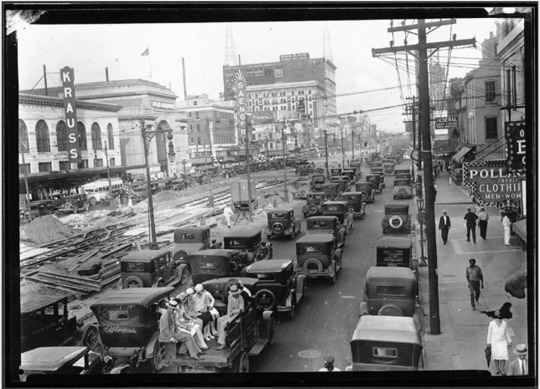
The Jim Crow laws were heavily enforced, as was the 'One Drop' rule. If Alastor was a mixed race black man, he would not have been able to attend a white school, use the same public transport, and would have shopped at black-local stores and restaurants under threat of violence. If he was mixed with any other race, some Jim Crow laws didn't apply, but state or city laws might specify differently.
Just because Alastor wears a suit, it doesn't mean he was rich in life. Radio personalities often didn't earn a fortune. Unless he owned his own broadcast, he was paid by a private company for long shifts of hosting music, news, and radio plays. In 1930, 40% of households owned at least one radio, which means that a popular radio host would have been easily recognized.
If he was in his late 30's in 1933, he might have fought in WW1, so long as he was over the age of 21. Some cities gave veterans small benefits, or encouraged the community to give them jobs. This often did not include veterans of color.
New Orleans was famous for being one of the least Christian cities in America, thanks to its unique immigrant and slave population. Haitian-based faiths and practices (such as voudo), indigenous cultures, Asian Buddhism, and atheism were common. But Christianity was still the official, law-enforced religion. Schooling involved reading the Bible, laws were sworn to Jesus, etc.
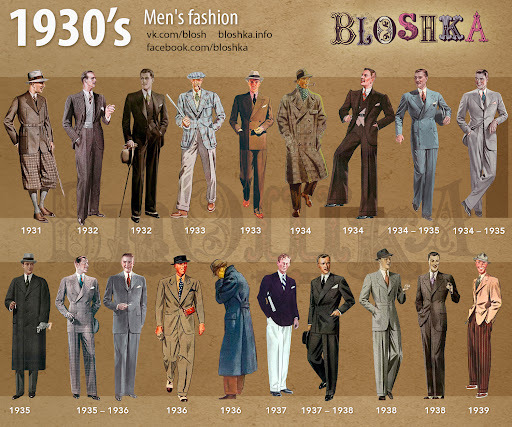
Alastor's outfit in Hazbin Hotel isn't very accurate to real-life American men's fashions of the time. Back then, deviating from the norm with the smallest detail would have stuck out like a sore thumb - like his white-lined lapels. Men always wore a hat. They were allowed to go without a waistcoat, but not a jacket. Belts were becoming more popular than suspenders. The silhouette was bulkier than the slimmer, Italian cuts of our modern times, especially the pants. Hair was kept short, and oiled down in a side part. Americans preferred the clean shaven look. Ties were essential unless you were a blue-collar laborer. Colors were almost universally muted neutral tones for everyday wear. The most colorful textiles for men were sporting outfits, like a tennis jacket.
If Alastor was a middle-class single man, he likely would have lived in an inner-city apartment, in an ethnic neighborhood. He probably didn't own a car, and took public transit like the streetcars. If he owned a house, it would likely have been an inheritance, and even the more opulent houses of the time would have looked small and plain to our eyes.
Because of the Great Depression, unmarried men were becoming the norm, rather than the exception. Men of the community who were sought after but remained single were suspect to gossip, but less ire than you might think; in the '30s, American queer culture was going through a very sharp revival, escaping the rigid Victorian era and before the puritan 40's/50's. But as a mixed-race man, it may have been illegal for a white woman to marry him, as the Jim Crow laws forbade the marriage of white people and Black/Asian people.
A middle class city household would have had electricity, gas heating, indoor plumbing, but may not have had running taps or a gas stove. Even with decent means, Alastor might have been using a potbelly woodburning stove, a dry sink/washbasin, wooden bathtub, and did his own laundry instead of sending it to the neighborhood laundresses. He may or may not have bothered with an icebox. Fresh groceries needed to be cooked and eaten soon, as things like pasteurized milk or store refrigeration wasn't a thing.
If he had enough money, then he almost certainly hired maids or other servants. Whether the maid came over just once a week, or did the shopping and laundry every other day, hired help was much more common back then, especially if he had no wife.
The most popular musicians in 1933 were Bing Crosby, George Olsen, and Leo Reisman. As you might have noticed, it was trendy for the lead singer to be backed by an orchestra, not a 'band' of just four other people like today. The most popular radio shows were Dick Tracy, Sherlock Holmes, and Doc Savage. They were recordings the radio station would buy and then broadcast, or sometimes the actors were live on the air. The radio host was usually not the journalist - the production team was responsible for writing his script.
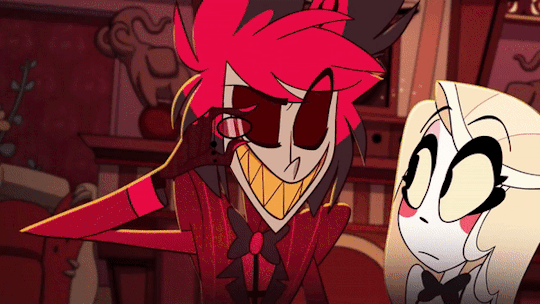
#alastor#alastor the radio demon#hazbin hotel#hazbin alastor#alastor headcanons#hazbin hotel headcanon
109 notes
·
View notes
Text
The Ethnostate Canard




This is a reminder that the framing of Israel as a Jewish “ethnostate” equivalent to what Nazis want a White Ethnostate to be and the claimed moral equivalence of Zionism to White Nationalism came from Neo-Nazis. It is a Neo-Nazi talking point.
Actual ethnostates are defined by restricting citizenship to members of a specific race or ethnicity, and factually, Israel just does not do that; 73.5% of Israelis are Jewish, 21% are Arab (not counting Arabs in Gaza & the West Bank), and an additional 5.5% are other ethnicities. While Israel does define itself as a Jewish nation-state and does extend a special right of return that guarantees Israel will facilitate the immigration of Jews in diaspora, neither of these things are particularly exceptional—most SWANA countries are explicitly Arab nation-states, and many countries, from Ghana to Ireland to Spain to Armenia, have a right of return for members of specific historically displaced ethnic groups, of which Jews are one.
There are absolutely valid criticisms to be made of the Zionist movement (in theory and in practice), the nation-state model in general, and the fact that specifically Israel’s right of return does not cover the primary ethnic group Israel itself displaced: Palestinians. The latter especially is a common criticism of Israel, and it’s one I am extremely sympathetic to—like, maybe I’m off base here, but I feel like the bare minimum Israel can do for the Palestinians they displaced in the Nakbah and Naksa is to guarantee
full citizenship
return of stolen property if possible
reparations, including an allotment of land
fully facilitated immigration to Israel comparable to what is done for Aliyah
and most urgently a ceasefire and a commitment to never bomb a single inch of Palestinian land or kill a single Palestinian noncombatant again
And I don’t think criticism of Israel & advocacy for the Palestinians is at odds with this: Israel’s oppression & myriad injustices against Palestinians just does not a White Ethnostate™️ make, and we need to be able to recognize the facts of Israel’s injustices while being critical of the narratives we slot them into. Specifically in this case, we need to remember as anti-racists & people who care about equity that a common tactic Nazis, racists, and other bigots like to use is to point to things like affirmative action, Historically Black Colleges, Black churches, Pride parades, “safe spaces”, and such that exist to provide special protections for marginalized & oppressed people, and then say “Well, why don’t we get that too? I (a member of the privileged majority) just want what the minorities have!”
It is important in any of these cases to recognize Nazis are doing this in bad faith, and whatever good-faith criticisms a progressive person can have of affirmative action or safe spaces or how they can be abused, not to adopt the Nazi’s framing of these special protections, lest we label affirmative action “Black Supremacy” and queer safe spaces “Gay Supremacy” or such nonsense. Unfortunately, the left dropped the ball with the “Israel is a Jewish Ethnostate” line.
The word “Ethnostate” really didn’t appear outside its strictly literal definition in academic writing before around 2013-2014, when White Nationalists began to use the previously-mentioned tactic, and incorporated it into their propaganda—they even reprinted Herzl’s “The Jewish State” with a foreword about how to co-opt it—where they started to call the Jewish nation-state of Israel an “Ethnostate” & claim they just wanted what the Jews had, for White people. The two main problems with that is that a) a globally oppressed minority (Jews) getting special protections is not the same as a globally dominant one (White People™️) getting further protections, and b) they didn’t want a White equivalent to Israel (they didn’t want a nation-state); they wanted an ethnostate and they projected that onto Israel.
And this is where the left failed Jews. Because the left only started to use the word “ethnostate” after Richard Spencer called Israel one at a Neo-Nazi rally in Florida—at the same time he said he wanted a “safe space” for White people like minorities had. And the left, rather than looking at the man who makes no bones about hating Jews, and asking themselves, “should I maybe be more critical about accepting how the man who loves Hitler and wants to genocide Jews and gay people frames what safe spaces and the Jewish state are?”, turned around and said, “Nah, he’s right. Jews are like Nazis.”
220 notes
·
View notes